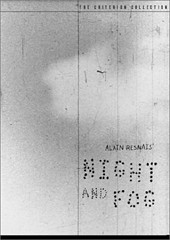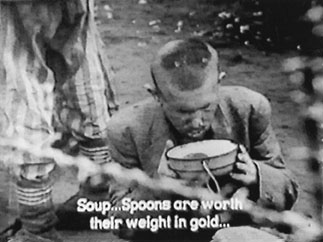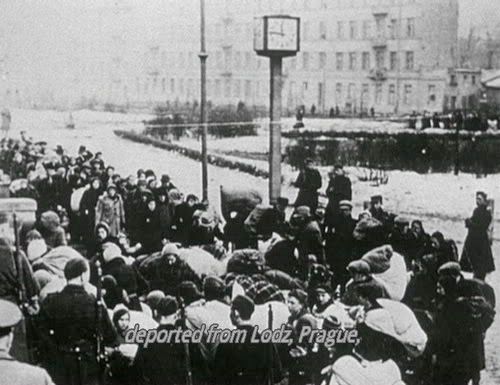← Back to Reviews
in
Night and Fog (Alain Resnais, 1955)

This film, the first Resnais film I ever watched, is probably too potent for me to even discuss. It's 32 minutes long, and it's equally divided up into what the WWII Nazis at the concentration camps (Auschwitz, Birkenau, Majdanek, Struthof, Mathausen) documented in B&W with what the Allies found when they "liberated" the camps, and color footage of what the camps looked like 10 years later. The narration, written by poet Jean Cayrol and spoken by Michel Bouquet (Le Jouet, the original The Toy) is incredibly moving, as is the powerful music by Hanns Eisler. For me to even try to put what this movie conveys into some critical context seems to make me less of a human being, but I chose this as a thread, so I'll give it a try.

One of the subversive things about Night and Fog is that, even though almost NONE of its footage was readily available before the film's release, most people today believe they know the full measure of the atrocities committed at these camps. If you watch Night and Fog, which is highly philosophical and almost subliminal, you may well wonder what the big deal is today. However, I have showed this film to all my high school students; you know, the ones who think that the coolest scenes in Saving Private Ryan are the ones where the guy on Omaha Beach takes off the helmet which saved his life and immediately has his brains splattered, and the scene with the dueling snipers, where Jackson puts a hole in the German's shooting eye. Anyway, they just sit there, reading the subtitles and wondering what the point is, and then, all of a sudden, in the final eight minutes, the film turns into the most powerful thing you've ever experienced. All my female students are crying (just like this big wuss), but my male students aren't exactly crying, but they are quite impressed by the images which they could never imagine that they would ever see without special effects.


As I mentioned in my first post, Resnais films are mostly about War and Rememberance. This film is the most perfect example of this in his entire filmography. At the end of Night and Fog, the narrator wonders if man will ever fully escape from enslaving and killing his fellow man when he finds it "necessary". The narrator also wonders who will ever take responsibility for the unspeakable horrors I will not show you here. Apparently, Resnais intended Night and Fog as a commentary on France's current occupation of Algeria in the mid-1950s and how his own beloved people could follow in the Nazis' footsteps by not learning from history. In fact, there are a few implications in Night and Fog that the French Vichy government aided the Nazis in their extermination of undesirables, but since this film was sponsored by the 1955 French government, anything along those lines is supposed to have been censored.

All I can say is that if you can watch this film without becoming an overflowing wall of tears, then you're a much better man than I. I'm not actually sure if the film appeals more to one's brain, heart, soul or philosophy, but I truly believe everyone should watch Night and Fog at least once. I'll understand if you can't take it again. but I'm up to about eight times now, and I feel good about myself every time I show it to a new set of students. I know; I'm reprehensible.

This film, the first Resnais film I ever watched, is probably too potent for me to even discuss. It's 32 minutes long, and it's equally divided up into what the WWII Nazis at the concentration camps (Auschwitz, Birkenau, Majdanek, Struthof, Mathausen) documented in B&W with what the Allies found when they "liberated" the camps, and color footage of what the camps looked like 10 years later. The narration, written by poet Jean Cayrol and spoken by Michel Bouquet (Le Jouet, the original The Toy) is incredibly moving, as is the powerful music by Hanns Eisler. For me to even try to put what this movie conveys into some critical context seems to make me less of a human being, but I chose this as a thread, so I'll give it a try.

One of the subversive things about Night and Fog is that, even though almost NONE of its footage was readily available before the film's release, most people today believe they know the full measure of the atrocities committed at these camps. If you watch Night and Fog, which is highly philosophical and almost subliminal, you may well wonder what the big deal is today. However, I have showed this film to all my high school students; you know, the ones who think that the coolest scenes in Saving Private Ryan are the ones where the guy on Omaha Beach takes off the helmet which saved his life and immediately has his brains splattered, and the scene with the dueling snipers, where Jackson puts a hole in the German's shooting eye. Anyway, they just sit there, reading the subtitles and wondering what the point is, and then, all of a sudden, in the final eight minutes, the film turns into the most powerful thing you've ever experienced. All my female students are crying (just like this big wuss), but my male students aren't exactly crying, but they are quite impressed by the images which they could never imagine that they would ever see without special effects.


As I mentioned in my first post, Resnais films are mostly about War and Rememberance. This film is the most perfect example of this in his entire filmography. At the end of Night and Fog, the narrator wonders if man will ever fully escape from enslaving and killing his fellow man when he finds it "necessary". The narrator also wonders who will ever take responsibility for the unspeakable horrors I will not show you here. Apparently, Resnais intended Night and Fog as a commentary on France's current occupation of Algeria in the mid-1950s and how his own beloved people could follow in the Nazis' footsteps by not learning from history. In fact, there are a few implications in Night and Fog that the French Vichy government aided the Nazis in their extermination of undesirables, but since this film was sponsored by the 1955 French government, anything along those lines is supposed to have been censored.

All I can say is that if you can watch this film without becoming an overflowing wall of tears, then you're a much better man than I. I'm not actually sure if the film appeals more to one's brain, heart, soul or philosophy, but I truly believe everyone should watch Night and Fog at least once. I'll understand if you can't take it again. but I'm up to about eight times now, and I feel good about myself every time I show it to a new set of students. I know; I'm reprehensible.
